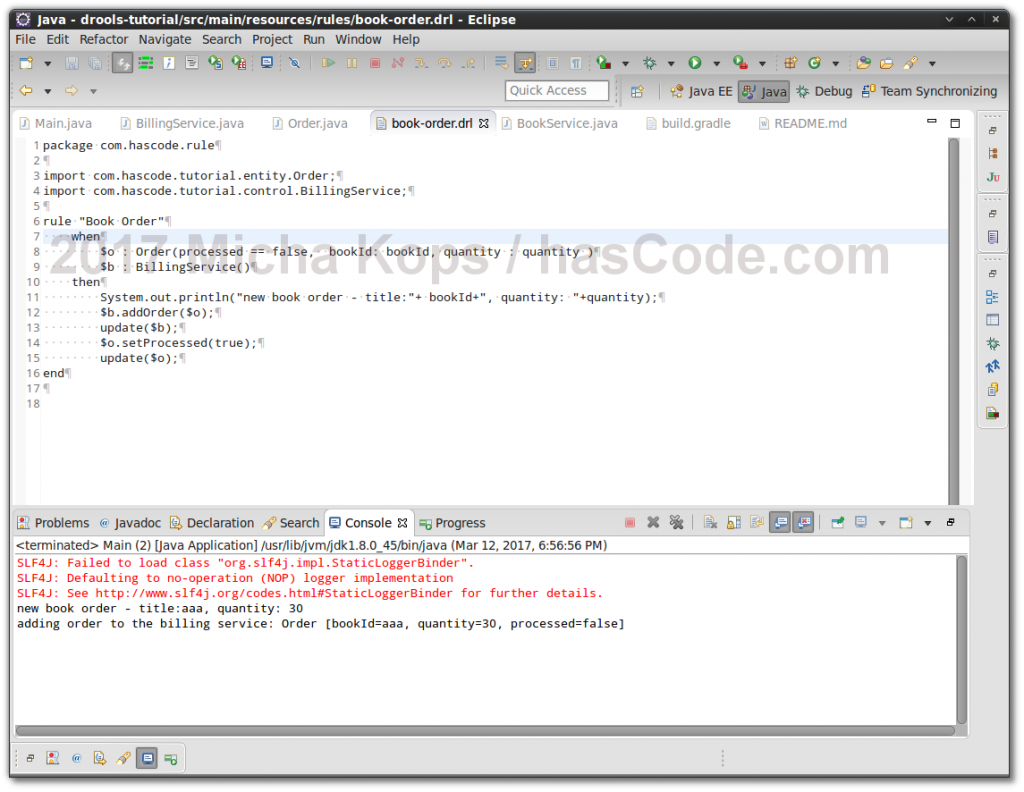Drools is a slim Business Rules Management System (BRMS) solution with different integrations and tools available.
In the following short snippet I’d like to demonstrate how to integrate a simple rule engine into an application using this library.

Dependencies
Using Gradle here we only need to add one dependency for drools-compiler to our project’s build.gradle. In addition, we’re adding a task to execute our application.
apply plugin: 'java'
sourceCompatibility = 1.8
repositories {
mavenCentral()
jcenter()
}
dependencies {
compile 'org.drools:drools-compiler:6.5.0.Final'
}
task runExample(type:JavaExec) {
main = "com.hascode.tutorial.Main"
classpath = sourceSets.main.runtimeClasspath
}Sample Application
This is our short example application simulating a book order service.
BookService
Our book service is responsible for handling orders and also initializes the drools API using the KnowledgeBuilder, KieBase and Kie-Session.
package com.hascode.tutorial.boundary;
import java.util.ArrayList;
import java.util.List;
import org.kie.api.KieBase;
import org.kie.api.io.ResourceType;
import org.kie.api.runtime.StatelessKieSession;
import org.kie.internal.builder.KnowledgeBuilder;
import org.kie.internal.builder.KnowledgeBuilderFactory;
import org.kie.internal.io.ResourceFactory;
import com.hascode.tutorial.control.BillingService;
import com.hascode.tutorial.entity.Order;
public class BookService {
private final BillingService billingService = new BillingService();
private final KnowledgeBuilder kbuilder = KnowledgeBuilderFactory.newKnowledgeBuilder();
private final KieBase kbase;
private final StatelessKieSession ksession;
public BookService() {
kbuilder.add(ResourceFactory.newClassPathResource("rules/book-order.drl"), ResourceType.DRL);
kbase = kbuilder.newKnowledgeBase();
ksession = kbase.newStatelessKieSession();
}
public void order(String bookId, int quantity) {
Order order = new Order(bookId, quantity);
List<Object> environment = new ArrayList<>();
environment.add(billingService);
environment.add(order);
ksession.execute(environment);
}
}BillingService
Our billing service “stores” orders..
package com.hascode.tutorial.control;
import java.util.ArrayList;
import java.util.List;
import com.hascode.tutorial.entity.Order;
public class BillingService {
private final List<Order> orders = new ArrayList<>();
public void addOrder(Order order) {
System.out.printf("adding order to the billing service: %s\n", order);
orders.add(order);
}
}Order
This is our simple order entity.
package com.hascode.tutorial.entity;
public class Order {
private final String bookId;
private final int quantity;
private boolean processed;
// constructor, getter/setter, toString ommitted..
}Business Rules
This is our simple business rule stored in a file named book-order.drl.
The rule adds a new incoming order to the billing service and alters its state.
A complete overview of the rule syntax can be found in the JBoss documentation here.
package com.hascode.rule
import com.hascode.tutorial.entity.Order;
import com.hascode.tutorial.control.BillingService;
rule "Book Order"
when
$o : Order(processed == false, bookId: bookId, quantity : quantity )
$b : BillingService()
then
System.out.println("new book order - title:"+ bookId+", quantity: "+quantity);
$b.addOrder($o);
update($b);
$o.setProcessed(true);
update($o);
endRunning the Example
This is a sample code that initializes our book service and adds an order:
package com.hascode.tutorial;
import com.hascode.tutorial.boundary.BookService;
public class Main {
public static void main(String[] args) {
BookService srv = new BookService();
srv.order("aaa", 30);
}
}We’re now ready to run our example in our IDE of choice or using Gradle in the command-line:
$ gradle runExample
[..]
new book order - title:aaa, quantity: 30
adding order to the billing service: Order [bookId=aaa, quantity=30, processed=false]
BUILD SUCCESSFUL
Total time: 4.468 secs
Tutorial Sources
Please feel free to download the tutorial sources from my GitHub repository, fork it there or clone it using Git:
git clone https://github.com/hascode/drools-tutorial.gitResources
Alternative: Activiti
Another interesting choice here is Activity, please feel free to have a look at my tutorial: "Business Process Modeling with Activiti and BPMN 2.0".
